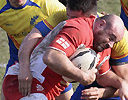 The World Cup! Such an intoxicating time for any rugby fan. And, on the whole, it’s been quite a happy time for the Australian fan. We’ve won it twice, the equal of anyone else, and the heroes of ’91 and ’99 are etched in folklore.
The World Cup! Such an intoxicating time for any rugby fan. And, on the whole, it’s been quite a happy time for the Australian fan. We’ve won it twice, the equal of anyone else, and the heroes of ’91 and ’99 are etched in folklore.
Also there was 2003, when we didn’t win, but pushed a pretty obviously superior England side to extra time in the final, plus the Wallabies knocked the All Blacks out in the semi-final against all reasonable expectations, so I think we can count that one as a moral victory.
Admittedly 1995 and 2007 were disappointing, but we can always apply the iron rule of international rugby: what happens in South Africa doesn’t really count.
And personally, I didn’t start watching rugby till 1988, which means I’ve never even seen New Zealand win a World Cup, so you can see what a jolly attitude I have to the event.
I do have a sneaking suspicion that sterling record will be marred this year, though – I don’t know how long the fine and noble tradition of Kiwi-choking can last. And that will no doubt be disappointing.
But no matter who wins, who chokes, and who gets sent home for drunk and disorderly conduct at New Plymouth’s Pink Jackrabbit Club, we will still be able to enjoy the heart and soul of the Cup: the minnows.
Now there is a school of thought that would like to see the minnows eliminated from the World Cup. The competition’s for the elite, goes this argument, and it degrades the tournament by allowing the incompetent and the part-timers to mix it with the big boys.
Why should the fans suffer the elongation of the showpiece of the sport with substandard performances and lopsided cakewalks?
While I fully understand and respect this argument, it is, of course, bollocks.
The minor nations make the World Cup. They give it its character, its spice, its sense of humanity.
Without them the Cup would be cold and heartless. It would be a soulless, dead-eyed celebration of mechanical athleticism, instead of a festival of the marvellous amateur spirit of True Rugby.
I have, as indicated, followed closely and passionately the proceedings of six World Cups. I have seen some wonderful rugby played.
I’ve seen Campese’s bamboozling of defences, Larkham’s miracle drop goal, the majestic stampedes of Jonah Lomu and the deadly precision of Jonny Wilkinson, not to mention the sheer euphoria of two Wallaby triumphs.
But for sheer, heartwarming heroism, I have yet to see anything to match Georgia versus England in 2003.
Georgia is not, of course, exactly a rugby power. When the Georgian team debuted at the World Cup it was not certain whether any of them had actually played rugby, or whether they’d been Shanghaied by a nefarious rugby press-gang and forced into service.
And they were coming up against England, led by Martin Johnson, guided by Wilkinson, at the time the most powerful and ruthless side on the planet. It was to be, without doubt, the rugby equivalent of a silverback gorilla banging a chihuahua’s head on a rock.
The teams took the field, and the slaughter began, with England crossing for its first try, after … seventeen minutes. Seventeen.
For seventeen of the most marvellous minutes in rugby history, the score stood at 0-0 and the amateur Georgians stood toe to toe on equal terms with the mightiest professionals, refusing to roll over, refusing to surrender, straining every sinew to keep holding out the soon-to-be world champions. It was thrilling to watch.
And of course it didn’t last. After those seventeen minutes were up, the floodgates opened, and the willing Georgian spirit was overwhelmed by the weary Georgian flesh and the English steamrollered over the top of them. And it went down in the books as just another minnow-slaughter.
But for seventeen minutes…oh the dreams of glory that were permitted to run riot in the imagination!
And that’s what will excite about the World Cup, no matter how one’s own chosen team performs. The possibility of another seventeen minutes.
The potential, if not for the far-fetched fantasy of Russia knocking over Australia or Namibia taking out South Africa, for at least the odd moment of inspiration from the unknowns of the rugby universe.
To see, perhaps, a sweeping Romanian backline move, or a bullocking American cross the line to the wild cheers of the four of his countrymen who know what rugby is.
Or to revel in the quicksilver enthusiasm of the Japanese, always outmatched for size and athleticism, but never for effort or smarts.
We’ll no doubt see a few of these moments, on the way to the inevitable clashes of titans once the pool matches are finished.
Of course, in the end we will delight in the slick brilliance of the greatest players in the world, as it should be.
But for a while, we will be able to celebrate just what makes the World Cup the World Cup – the little guys, doing it all for the love of the game.





























































































